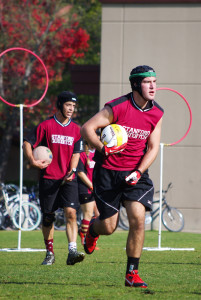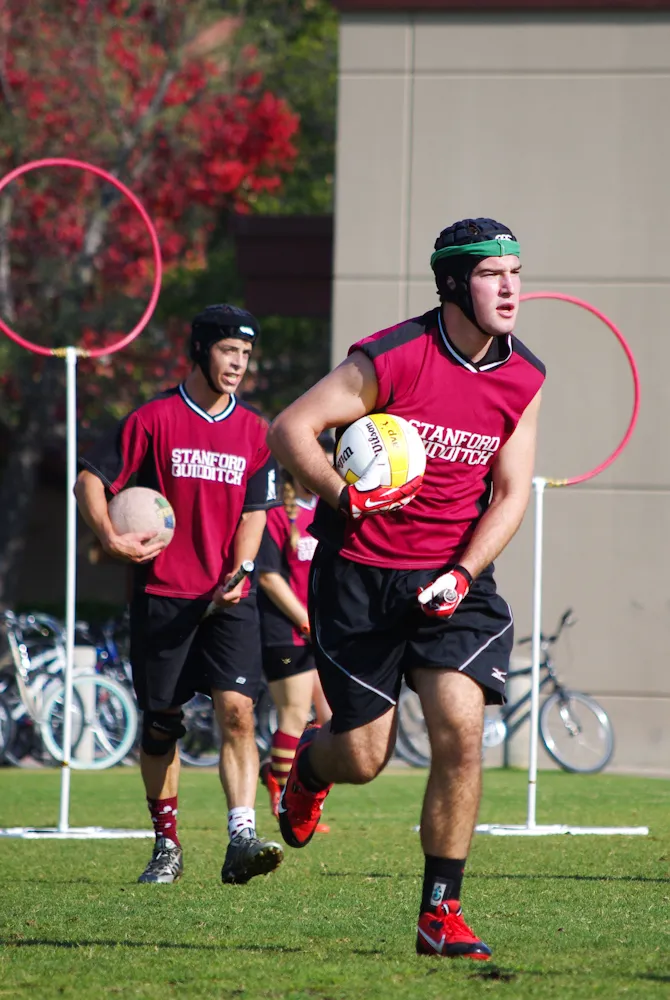
Though the sport’s origins lie in a fantasy world, Stanford’s Quidditch team draws its success from athletic commitment, not magic.
Hailey Clonts ‘16, team captain, said that the team has grown in size and intensity over the last two years.
“Not last year, but the year before, the team was pretty small and didn’t have people coming regularly,” she said. “Last year we had a bigger team, but mostly freshmen. Now we have returning players plus new freshmen.”
One freshman, Zebediah Martin ‘17, joined the team at his cousin’s urging.
“I read all of the books, watched all of the movies, and I really like Harry Potter, but I originally wasn’t going to join,” he said. But he soon fell in love with the game.
As a contact sport, Quidditch is more physical than most people expect, said Martin, who plays the position of chaser.
It’s also more competitive than some might expect.
This year, the team hopes to qualify for the Quidditch World Cup again after a successful run last year at tournaments in Los Angeles, Sacramento, Berkeley and Florida.
To accomplish this goal, the team practices every Saturday, Sunday and Thursday on Wilbur Field, performing drills and running through plays.
“We start off throwing while everyone gets here and then, when most people are here, we run around the field,” Clonts said. “Then we’ll do dynamics where we do high knees, butt kicks, those kind of things.”
Every first practice gives new players a chance to test their skills on the field.
“We throw them into a game situation for the very first practice,” Clonts added. “It’s chaotic, but they get the hang of it.”
Many team members played multiple sports in the past. Martin played soccer, track and tennis in high school, while Clonts played netball and gymnastics.
“A variety of sports lend themselves to different positions and different skill sets,” said Coach Natalie Stottler ‘14 of players’ athletic backgrounds.
During gameplay there are three chasers, two beaters, one keeper and one seeker. Players with experience in sports like soccer and basketball are well-suited for the position of chaser, as it entails running up and down the field and scoring with the quaffle—sdf a volleyball.
On defense, beaters throw dodgeballs at players to prevent them from scoring. Given that one hand must be on the broom at any one point, one-handed throwing skills from water polo are also useful.
Keepers, though involved in defense like goalies, are similar to quarterbacks in that they dictate offensive quaffle play as well, said David Saltzman M.S. ‘14, who played keeper last year.
Given how unique the sport is, Stottler said that the team is mostly looking for students with a willingness to learn.
“We’ve taken people who don’t really have an athletic background, and our goal is to help people become confident athletically,” Stottler said.
The sport isn’t all work though, with tournaments providing an escape from the academic rigor of Stanford.
“It’s a lot of fun going somewhere, and it takes you out of the regular academic environment,” Saltzman said. “Even if it’s just a weekend tournament, still when you come back it feels like you were just on a vacation.”
Stottler said her favorite moment as a player happened last year when the Stanford team beat USC in Los Angeles, ending the Trojans’ 10-month winning streak. The snitch, a tennis ball in a sock trailing from a gold-painted cross-country runner or wrestler, was caught outside of the Quidditch pitch boundaries, a rare occurrence that ended the game in Stanford’s favor.
“We were beyond the underdog, and somehow won that game and ended [USC’s] undefeated streak,” Stottler said.
She still has the match scoreboard on her wall.
Contact Alex Zivkovic at aleksa ‘at’ stanford.edu.
